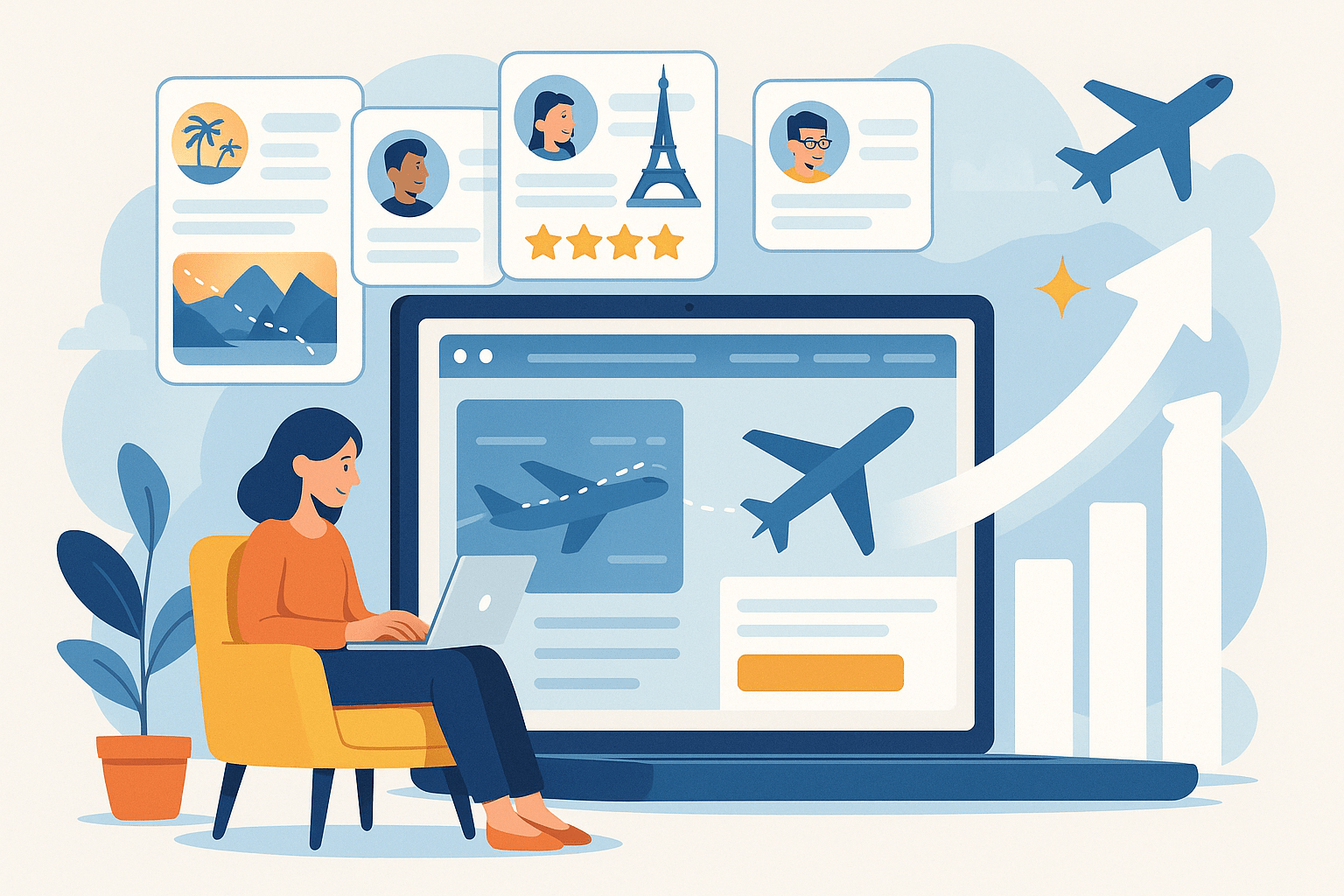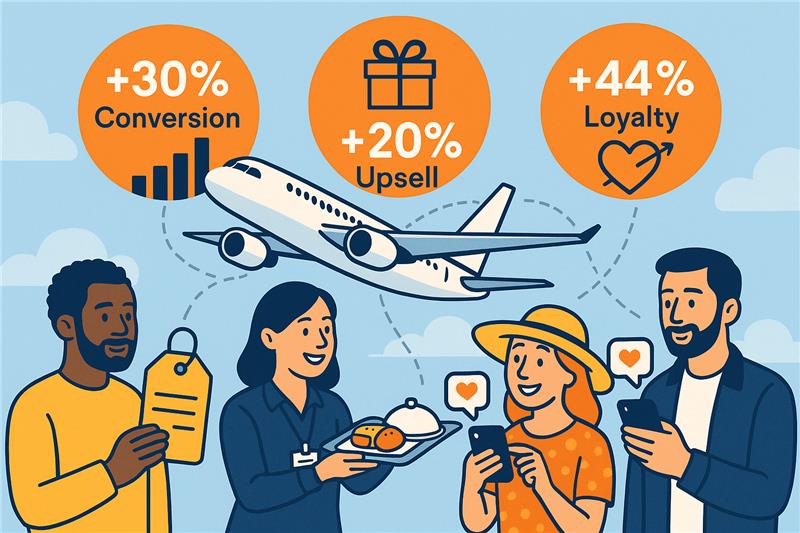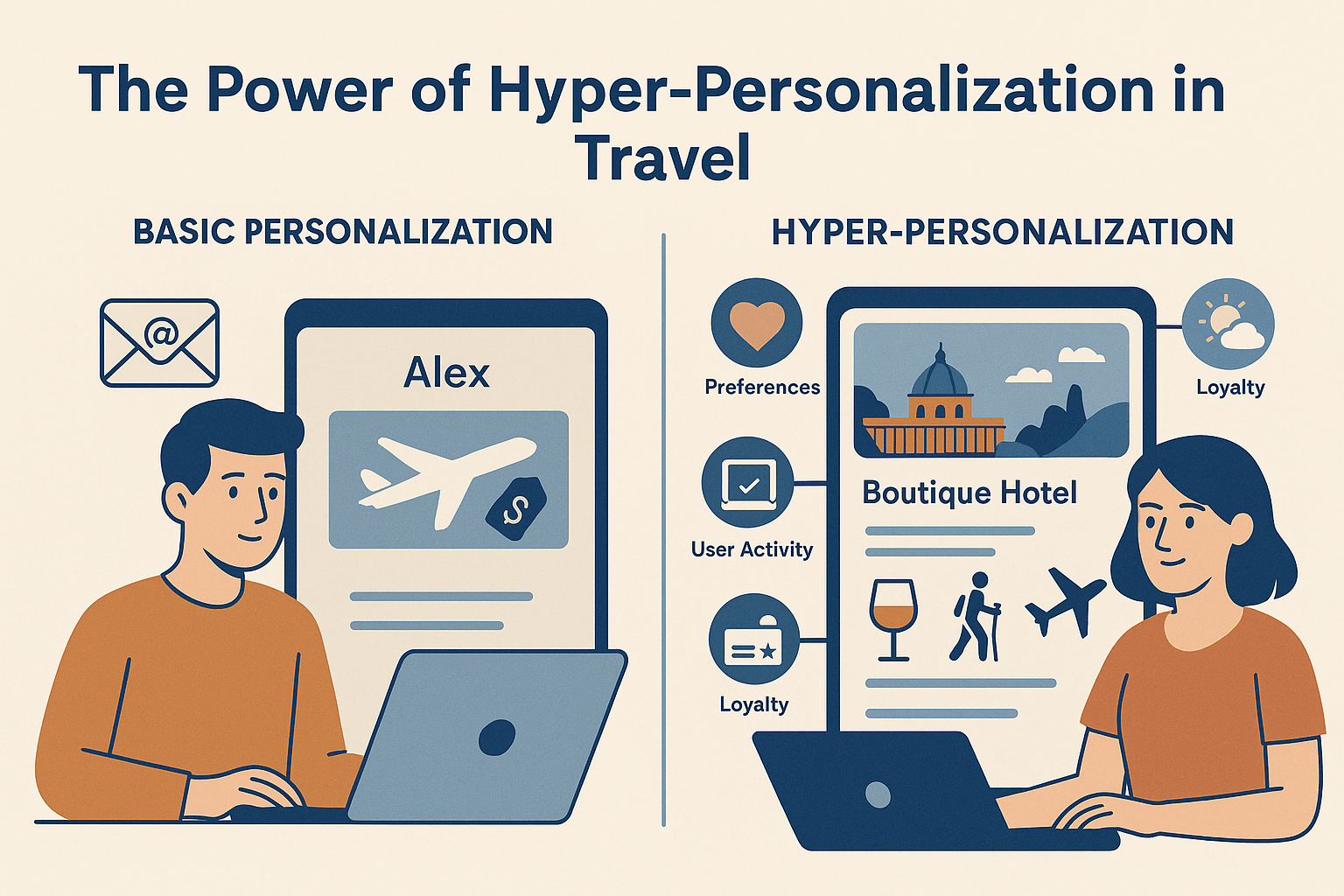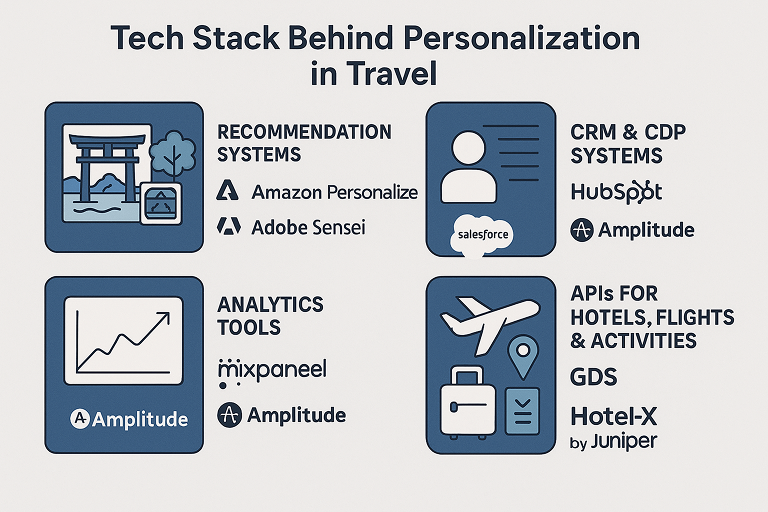
Travel
Boost Travel Bookings with Hyper-Personalized Recommendations
Introduction: The Rise of Personalization in Travel

Travelers today demand more than basic travel plans because they seek customized experiences which match their needs. The traditional approach of generic travel packages does not exist anymore. The modern travel industry requires personalization as a fundamental requirement.
Travelers who plan either brief weekend vacations or extended month-long journeys seek customized suggestions along with services and experiences which match their individual preferences. The travel industry currently undergoes a significant transformation because of this changing trend.
The growing importance of personalization stands as the main reason for its increasing popularity in the travel industry:
- Modern travelers crave relevance. Travelers seek accommodations and transportation and activities which match their individual preferences rather than being presented with random options.
- Technology makes it possible. Travel companies now possess the ability to deliver highly customized real-time suggestions through AI combined with data analytics along with CRM tools.
- Better experiences = higher loyalty. Travelers who receive personalized attention become loyal customers who bring their friends to the same experience.
- It boosts bookings. The implementation of personalized elements tends to produce faster customer choices together with improved conversion percentages.
The conclusion stands as follows: Through personalized experiences travelers develop feelings of recognition and understanding which leads to unforgettable journeys beyond basic travel.
Why Personalization Drives More Bookings

Travel personalization has evolved from a luxury feature into a vital tool which transforms the modern travel experience. Travelers desire customized experiences which when brands provide lead to strong emotional connections that increases bookings and results in contented customers. The key lies in identifying unique traveler characteristics to deliver direct messages which match their individual preferences.
Personalization operates through basic but powerful psychological principles. People develop trust and excitement because they encounter recommendations which appear specially designed for their individual situations. The feeling of being valued causes people to select your service instead of competing options. The process of presenting travelers with personalized suggestions that connect with their deepest desires results in a more enjoyable and engaging travel planning experience compared to generic messages and random deals.
Here’s what data tells us about the power of personalization:
- Conversion rates increase: The use of personalized recommendations leads to a 30% rise in conversion rates which transforms casual browsers into confirmed bookings.
- Upsell potential grows: Travelers show a 20% increased likelihood to purchase upgrades or add-ons when they receive offers tailored to their specific interests.
- Loyalty improves: Travelers who experience personalized services show 44% higher rates of returning to the brand due to feeling understood.
The primary desire of travelers remains to feel important to the service provider. When you invest time in understanding their preferences along with their travel history and behavioral patterns you can present suitable trips and activities and deals that align with their distinct style. The customized approach you provide acts as the essential factor which transforms a potential customer from uncertainty to full commitment.
Key Challenges with Generic Travel Recommendations

Modern travelers demand personalized recommendations which go beyond generic hotel and tour listings. Travelers require intelligent customized proposals which demonstrate real understanding of their search needs. Traditional travel recommendation systems continue to depend on standardized methods which do not meet individual needs of travelers. The situation begins to deteriorate when this occurs.
The failure of standard travel recommendations to meet modern expectations creates hidden damage to your business potential which needs analysis.
- Traditional Recommendation Engines Fall Short
Older recommendation systems present users with suggestions through categories such as "top European destinations" and "best beach resorts." The recommendations lack understanding about the following aspects:
- The traveler is either a solo backpacker or a luxury-seeking couple
- The traveler prefers hiking or food tours or spa lounging
- The traveler has visited that "top-rated" destination before
The recommendation engines disregard personal preferences together with booking history and user behavior thus creating an impersonal and frustrating user experience.
- Missed Revenue from Generic Suggestions
Your platform displays generic deals to all users thus you forfeit significant potential revenue. The implementation of personalized recommendations produces the following benefits:
- Higher-value bookings
- More repeat travelers
- More upselling opportunities (like private transfers or exclusive tours)
Your platform's lack of tailored suggestions causes both customer attrition and lost revenue growth opportunities.
- Too Many Irrelevant Options
You have experienced the frustration of receiving over 50 hotel listings which completely fail to align with your preferences? Travelers find generic platforms equally frustrating because they present irrelevant information. The generic recommendations cause travelers to experience:
- Overwhelmed
- Distracted
- Likely to bounce from your site
The future of travel recommendations will focus on individualized experiences rather than broad approaches. Showing travelers exactly what they want leads to faster bookings together with increased spending and more return visits.
The Power of Hyper-Personalization in Travel

The current travel environment demands personalization as a mandatory requirement instead of being an optional feature. Basic personalization differs substantially from hyper-personalization because the latter determines whether customers will have a positive or negative experience.
Basic vs. Hyper-Personalization
- Basic personalization involves sending emails with traveler names and displaying trip-related deals based on their previous travels. The approach maintains simplicity yet delivers limited effectiveness because it ends at this point.
- Hyper-personalization represents a higher level of personalization. The system uses current user activities together with individual preferences and browsing patterns and loyalty database information and external factors such as weather conditions to create customized travel experiences.
A platform that understands user preferences would display the following information:
- The platform displays boutique hotels with balcony views in Rome due to user interest in "rooftop views" from last week.
- The system generates a weekend travel plan based on user interest categories such as wine tasting and hiking activities.
- The AI system recommends flight departures at less crowded times because the user typically chooses flights away from crowds.
Real-Time, Context-Aware Personalization
Technology achieves its magic through the tracking of user signals that enable immediate responses based on their clicked content and time duration and skipped items:
- When a user accesses the platform from a chilly location the technology system recommends beach vacation destinations
- When users regularly search for romantic destinations the system will present couples travel packages as a key suggestion
- The system suggests visa-on-arrival countries to travelers who need immediate travel options
The loyalty-building effect of hyper-personalization along with increased conversion rates and personalized recognition leads to a better traveler experience. Customers return to businesses that provide personal recognition because they need this feeling in today's market with endless choices available to them.
Tech Stack Behind Personalization in Travel

To significantly improve travel reservations, personalization is essential, driving customer faithfulness, improved conversion metrics, and memorable journeys. But what enables this customization? Let's examine the key technological infrastructure that contemporary travel companies employ internally.
- Recommendation Systems
These form the core of any customized platform. Driven by AI/ML, they assess user actions, inclinations, and past reservations to propose suitable hotels, flights, or events. Whether it’s “Other travelers also reserved this coastal resort” or “Highly-rated excursions in Rome 🇮🇹,” these systems generate customized proposals that lead to conversions.
- Amazon Personalize – Instant, highly adaptable recommendations
- Adobe Sensei – Comprehensive personalization leveraging customer motivation and knowledge
- CRM & CDP Systems
Gaining insight into your traveler base is crucial. CRM (Customer Relationship Management) and CDP (Customer Data Platform) systems save and consolidate customer data, reservation choices, and communication records from various sources.
- HubSpot – Useful for cultivating returning travelers through email campaigns 📧
- Salesforce Travel Edition – Adaptable, sector-focused CRM with intelligent automation
- Analytics Tools
To personalize successfully, monitoring user behavior is essential, including clicks, searches, and points of abandonment.
- Mixpanel – Illustrate user paths and significant behavioral trends
- Amplitude – Analyze user groups and long-term value
- APIs for Hotels, Flights & Activities
A fluid, personalized experience requires comprehensive integrations. APIs offer current access to inventory, prices, and availability customized for each user.
- GDS (Global Distribution System) – Links to airlines and hotels
- Hotel-X by Juniper – API aggregator providing up-to-date hotel information
Key Features to Look for in a Personalization Engine
.png)
The travel industry now demands hyper-personalized experiences thus requiring the appropriate personalization engine as an essential element. The appropriate tool functions to generate relevant offers which become irresistible and convert customers when operating as a travel agency or OTA or booking platform.
The essential features you need to seek include:
AI/ML-Driven Recommendation Engine
Your personalization system needs to use artificial intelligence (AI) and machine learning (ML) algorithms to study how customers behave and what they like. Customers benefit from dynamic recommendations which include beach resort suggestions to frequent tropical travelers along with airport transfer upselling during booking.
- Learns from real-time and historical user data
- Offers smarter cross-sells and upsells
- Adapts to changing travel behavior
Integrations with CRM, CDP & Booking Platforms
An effective engine needs to connect smoothly with your pre-existing systems which include CRM, Customer Data Platform (CDP) and booking engines. This integration establishes a complete profile of your travelers by using all available data to generate personalized recommendations.
- When data synchronization works well it produces improved personalization results
- Allows targeting based on user actions
- Mitigates data isolation between systems.
Real-Time Decisioning & Content Delivery
The speed of operations plays a critical role in this process. An advanced personalization system must detect customer actions quickly to suggest last-minute upgrades during the checkout process.
- Dynamic content blocks on website or app
- Live offer generation
- Geo-location-based prompts
Integrated A/B Testing
Are you still struggling to select the most impactful message or design? With A/B testing, your personalization platform enables you to experiment with various components to discover the best arrangements that enhance interaction and reservations.
- Test messages, visuals, CTAs
- Track conversion improvement
- The personalization reasoning should be constantly refined.
How to Build a Personalized Travel Recommendation Engine
In the current digital age, travelers anticipate more than simple search outcomes; they desire suggestions that seem specifically designed for them. That's where a customized travel suggestion system becomes useful. Here’s how to create one that genuinely boosts interaction and reservations.
1. Chart the User Experience and Determine Personalization Opportunities
Begin by comprehending your users’ travel habits. Consider each interaction-from when they arrive on your website to when they complete a reservation.
Search for significant personalization opportunities:
- Homepage: Present popular locations based on prior actions
- Search options: Automatically propose options based on tastes or earlier journeys
- Checkout: Advise extras like protection or outings
2. Gather and Combine Your Information
You cannot customize what you do not comprehend. Develop a unified data layer incorporating:
- First-party information: Email registrations, preferences, stored journeys
- Behavioral information: Clicks, searches, scroll patterns
- Transactional information: Previous reservations, cancellation records, loyalty benefits
This offers you a comprehensive view of your traveler.
3. Select Appropriate Technology and Algorithms
Here's where the real work begins! Implement machine learning models and systems driven by rules to suggest:
- Comparable locations based on previous selections
- Offers that match financial plans and schedules
- Customized bundles designed for family trips, individual adventurers, or high-end experiences
Enhancement: Employ AI to modify results instantly.
4. Evaluate, Assess, and Improve
Initially, no system performs flawlessly. Conduct A/B tests to assess varied recommendation approaches. Monitor metrics such as:
- Click-through percentages
- Improvement in conversions
- Typical reservation cost
Continuous adjustment leads to superior results.
Case Studies / Success Stories
Travel brands employ hyper-personalization to generate revenue and build customer loyalty as demonstrated by these real-world examples. These real-world travel examples demonstrate how technology-based recommendations work effectively in practice.
Example 1: OTA Boosting Upsells with Real-Time Personalization
An Online Travel Agency (OTA) experienced poor success in selling additional services after customers made their initial reservations. Through the implementation of a real-time personalization system the OTA started making personalized recommendations of airport transfers and lounge access and travel insurance based on user preferences and travel behaviors.
Key Wins:
- The OTA saw a 38% growth in its revenue from ground transportation services
- The company experienced a 26% increase in travel insurance sales
- The system generated dynamic offers which modified their content according to the time, location and type of trip
The outcome delivered both satisfied travelers along with increased booking revenue yet the company maintained its current marketing budget.
Example 2: Niche Travel Agency Increasing Repeat Bookings
The boutique travel agency which focuses on luxury wellness retreats discovered that most customers failed to book again after their initial experience. Through personalized follow-up journeys within their CRM system they reconnected with past customers by providing tailored recommendations which matched their previous choices along with seasonal preferences.
Results at a Glance:
- The business achieved a 52% increase in repeat bookings during the nine-month period.
- The email open rates increased to 44%.
- The clients expressed that they felt personally invited and understood by the agency.
Through this human-centric approach the agency was able to convert single-time clients into loyal repeat travelers.
Example 3: Airline Vacation Arm Cross-Selling with Intent-Based Packaging
An airline's travel division aimed to boost package deal sales among customers who only booked flights. They utilized artificial intelligence to spot "booking intent" trends and developed well-timed, personalized vacation deals that included flights, hotels, and activities.
Success Metrics:
- A 30% rise in vacation package conversions
- Increased average reservation value for each tourist
- Decreased advertising expenses by focusing solely on users with strong intent
By forecasting traveler desires before they even searched, the airline unlocked new income streams by concentrating on potential customers.
The Future of Travel Booking: Predictive & Adaptive Personalization
The past time of searching through numerous travel options has become extinct. Travel in the future will operate through intelligent systems which provide direct solutions to individual needs. The current period marks the start of hyper-personalization as a standard practice beyond its status as a marketing term.
Where Hyper-Personalization Is Headed
Emerging technologies such as AI and AR/VR together with voice assistants enable the progression of personalization beyond destination recommendations.
- Voice-based bookings: Your app will complete all booking steps after you say “Book me a beach getaway next weekend.”
- AR/VR previews: Before making your booking you can virtually explore your hotel and tour through the preview feature.
- Predictive intent: The platform system will understand user requirements through analyzing previous actions together with emotional states and environmental conditions. (Think: suggesting a spa retreat when it’s been a stressful week.)
Personalization Across Every Channel
The modern traveler utilizes multiple devices while expecting consistent personalized service across all platforms they use.
- Web: Your homepage gets personalized through automatic recommendation systems.
- Application: Your present location triggers instant delivery of travel updates and special offers through the app.
- Chatbot: The system delivers intelligent responses based on your booking record and preference data.
- Call center: Your digital interaction records enable agents to provide seamless service without requiring you to restate information.
The application of predictive personalization will make your travel plans feel both personalized and efficient and suitable for individual needs whether you travel alone or with family.
Are you interested in learning how this can enhance your travel enterprise?
📅 Let's chat! Book a quick meeting here – we would like to demonstrate the possible outcomes to you.
Conclusion & What’s Next
Travelers today demand hyper-personalized experiences because this approach has become essential for business growth in the current travel industry. Travelers no longer accept standard recommendations and generic offers as their expectations have evolved. Modern travelers demand experiences that align with their individual preferences together with their behaviors and personal goals.
When you adopt hyper-personalized strategies you gain both increased conversion rates and repeat bookings while developing enduring customer loyalty within today's competitive market. The adoption of intelligent data-driven personalization techniques transforms the operational landscape for tour operators as well as OTAs and B2B travel brands.
Why It Works:
- Relevant content = higher engagement
- Better timing = more repeat bookings
- Tailored messaging = stronger customer loyalty
- Smarter insights = data-backed decision-making
What are the Next Steps?
Let's transform strategy into implementation. Here’s how to begin:
- Assess personalization platforms developed for the travel sector
- Experiment with some examples across email, app, and online experiences
- Dedicate resources to well-maintained data and intelligent AI connections
- Refine constantly using observations from customer actions
Keen to Enhance Reservations with Hyper-Personalization?
Allow us to demonstrate how it fits together. From suggestions to live automation - our personalization system is designed for outcomes.
👉 Arrange a complimentary customized demonstration now:
Let's examine how you might provide enhanced visitor interactions - and create genuine ROI.

Your Tech Partner for Scalable Travel Growth
We’re here to help you shape your business, so reach out to us today.